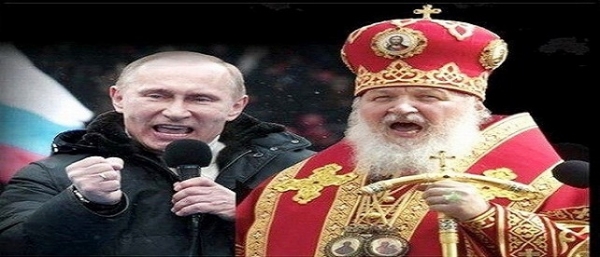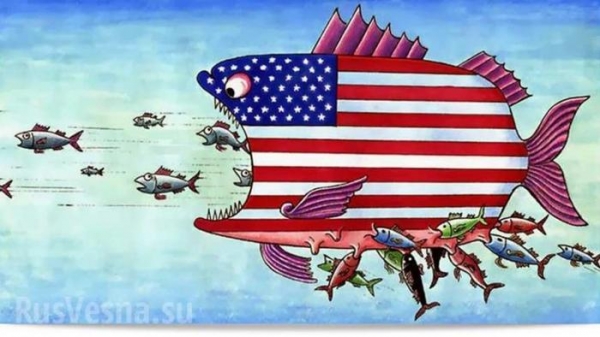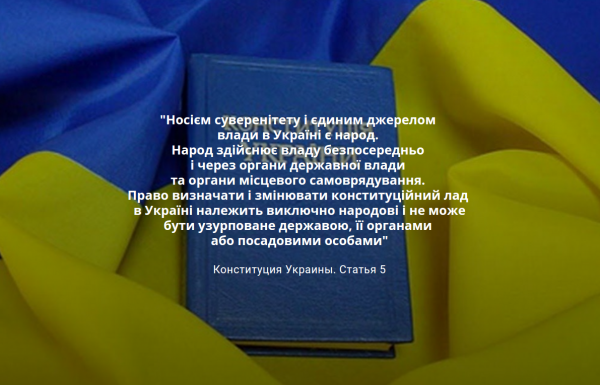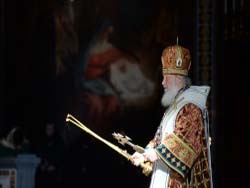The usurpation of the state and the nation
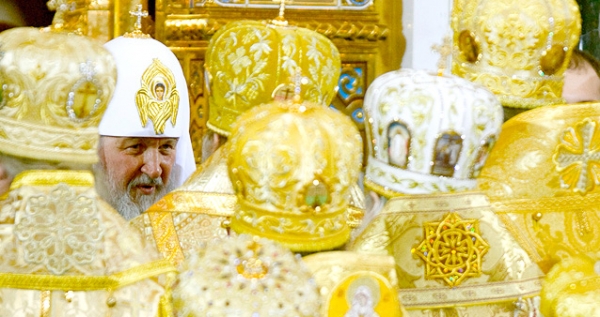 Recently in Moscow hosted a regular meeting of the so-called world Russian people’s Council, which traditionally was made by Patriarch Kirill. His speech shows, in my opinion, about the occurrence of a new phase in the clericalization of the Russian society: the Church, over the past decades sufficing with a status of not cheap managing authorities universally advocate openly declares its claim on the “state-forming” role — claims as baseless and dangerous.
Recently in Moscow hosted a regular meeting of the so-called world Russian people’s Council, which traditionally was made by Patriarch Kirill. His speech shows, in my opinion, about the occurrence of a new phase in the clericalization of the Russian society: the Church, over the past decades sufficing with a status of not cheap managing authorities universally advocate openly declares its claim on the “state-forming” role — claims as baseless and dangerous.
The Patriarch comes from a number of questionable assumptions. His main idea is that Russia today remains the community which fully based on the values of Christianity, while, for example, Europe from these values turned. The argument in favor of this thesis is very strange:it is argued that the emergence of the concept of “European civilization” that supposedly replaced the term “Christian world” in the eighteenth century, indicates “a retreat of Christian values in the West under the influence of secular ideas” (in my opinion, the understanding of Europe itself was at that time a result of the expansion of the boundaries of the Christian world that went far beyond the Old world, and nothing more). On this assumption, the Primate rejects the “European choice” and suggested that, in one way or another “Christian choice”, a choice in favor of “universal religion, but not the unifying”. There remains only to regret that it cannot hear hundreds of thousands of people brutally killed in the name of creating a “Latin American civilization”, the emergence of which in the full extent mentioned by Cyril, the Christian Maxim of “equality of distinct peoples and the respect for diversity of cultures”.
But the “Christian choice” is not the final point of evolution “absolute spirit”, the pastor hiding under the hood. He believes that the benchmark is Byzantine Christianity, because it was formed at the “crossroads of cultures”, combining efforts of representatives of different civilizations, and “carried Christian gifts to all the surrounding continents”, and it’s a questionable thesis, given as one who converted to Christianity a large part of the world, and who very quickly “cleaned” from Asia and Africa. Moreover, it soon becomes clear that all high religious pathos comes down ultimately to the approval of the “Russian understanding of Christianity”, which despises the Patriarch.
From this point begins the most significant issues. Chief among them: does not preclude such an approach is the assertion that “Christian culture is not reducible to a single national culture or group of cultures”? If this is true, then there is no “Russian Orthodoxy” can’t be, especially as he acknowledged that “the Russian civilization is not only Russian and not only Orthodox-Christian”. And, accordingly, all the preaching of national exclusiveness, which, in fact, represents the speech of the Patriarch, no more than heresy.
Moreover, if Christianity permeates different cultures and peoples, it should not get hung up on the idea of statehood, moreover, Jesus said: “Caesar and to God what is God’s” (Matt. 22: 20-22). Meanwhile, it is obvious that only the heirs of the Byzantine tradition in fact localize to the Church within the borders of States (in Russia, Greece, Armenia, Georgia, Ukraine, Serbia, etc.), while all the European branches of Christianity, except perhaps that of Anglicanism, and embody the Covenant of Christ that his Church is larger than any state.
The power and Majesty of Christianity — and any religion in General — is not that it is able to usurp state power, and that it contrasts the structured society domination is the community of people “United by agreement on the things they love” (St. Augustinus. De civitate Dei, XIX, 24). This community is becoming a force that saves the peoples from the state and opens the path from antiquity to modernity. On the contrary, all the aspirations of Christianity in his “Russian understanding” is a matter of not having the moral purity that allows you to build a community of faith, to usurp the state power system “in separately taken country” and turn it to the benefit of the Church hierarchy. Not by chance the first of the Russian “national tradition” Patriarch unabashedly calls the introduction of Church tithes — and it becomes clear that the ROC exemption from taxes and duties, just approved by the State Duma, not the last “moral” innovation, which expects the Russians in the near future.
Meanwhile most of the Patriarch’s speech dedicated to that Church hierarchs should, it would seem that the least touch. Rejecting the “European choice” and universal approaches, he begins to design the “Russian social ideal” figure out “the meaning and purpose of the development of the country”, to formulate the conceptual foundations of the concept “moral state”. And this part of his speech was written not by the words of the Church Hierarch, and “Newspeak” middle-level official. It appears, for example, that the school should educate people “in the spirit of national traditions and morals, is formed including under the influence of traditional religions” — for example, that “including…”, and under the influence of what? And what is a national tradition in a multinational state? In this case, you can “have a common, harmonized approaches to the development of training programs”? It turns out that crucial “the concept of humanitarian sovereignty of Russia” and the analysis “of the Russian ethno-cultural identity”. And finally, we hear the assertion that “the state… should be guided by a moral priority and the will of its people over other, especially external, sources of law”.
If we translate the speech of the Primate in the Russian language, free of inherent presidential Executive office official rhetoric, the main message boils down to this: the Russian state should be built on the basis of Orthodox interpretations of fairness;it must assume solidary society, with no place of competition and competition; the government in this state is exercised by the people and “listens to the people”; the legal rules are directly derived from moral canons; the state shall protect all types and forms of sovereignty from external influence; in the economic sphere is overcome the gap between “real value and speculative “economy””. In other words, we hear the call in the Frank and aggressive way — to overthrow existing nowadays in Russia the constitutional order through usurpation of power. But, apparently, due to the fact that the Patriarch refers not primarily to a mixed crowd who filled the meeting room, and to the “highest representatives of the legislative and Executive authorities of the Russian Federation”, the call no one is going to give a proper legal assessment.
In addition to attempts of usurpation of the state in the performance of Church hierarchs is noticeable and a different motive — an attempt to usurp national dimensions of the Russian statehood. Modern Russia is historically as a complex symbiosis of Kiev, Vladimir and North West Russia; was for centuries “reforged” Mongol yoke and European modernizations; “grow” huge territories of Siberia and Central Asia; developed and grew rich by the efforts of dozens of peoples inhabiting it. Return from understanding the Russian people as a civil and political community to the “Russianness” is a step towards the collapse of Russia and a social catastrophe, against which darkened all “geopolitical tragedy” of the twentieth century. Characteristically, all the above mentioned theses are formulated with “world” Russian Cathedral, that is, the event brought together not so much Russians, how many representatives of the notorious “Russian world”, United, to quote President Putin, “not only for our common cultural code but also an exceptionally powerful genetic code”. Who and on what basis arrogated to themselves the right to speak on behalf of the “Russian world”? And if the reckoning comes to this world on the basis of assessment is not cultural, not genetic “code”, why just the Russian government, for example, affects the rights of those Russians who are not lucky enough to have a second passport or residency in another country? The Church and the authorities in Russia do not just want to speak on behalf of the Russians: they aim first to determine their “Russianness” and only then think about how moral and universal values.
What is happening in Russia today events require unbiased understanding of the role of clericalism in the life of our society. In raising the role and prestige of religion and religious figures I, unlike many of my colleagues and friends, I see nothing dangerous or objectionable — in that case, if it is a natural consequence of selfless pastoral Ministry. However, if the Church and its Ministers begin to give the state what it should do, and what is different from the constitutional norms to follow if the bishops allow themselves to invent features and criteria of the national character and instead of preaching Christian brotherhood to erect barriers between peoples and civilizations, we are all standing at the dangerous line.
Post-Communist Russia has returned to the Church, the churches, taken away from her by the previous government. Now modern Russia should return in these temples the Church itself, replacing it with secular sites. The Church is not the intermediary between the state and society, it is nothing more than a means of communication between man and God. To put the Russian Church to her intended place, preventing potential usurpation by it of the Russian state and Russian nation, is more important today we have left.
Vladislav Inozemtsev